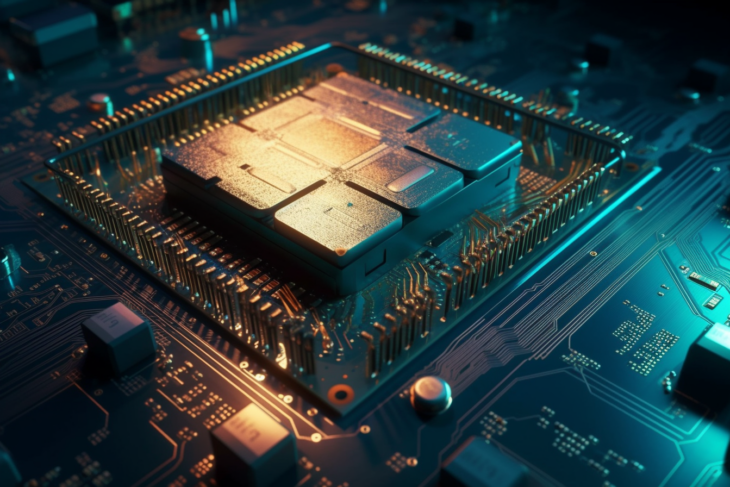
Samsung Electronics Faces Continued Profit Slowdown as AI Chip Demand Soars
SEOUL (Reuters) –
Samsung Electronics, the world’s leading memory chip maker, is set to report profit growth continuing to slow in its fourth quarter due to challenges in keeping up with Nvidia’s strong demand for artificial intelligence (AI) chips. The South Korean company, also a major player in smartphones and televisions, is expected to announce operating profit rising to 8.2 trillion won ($5.6 billion), up from a low base of 2.8 trillion won a year earlier but down from 9.18 trillion won in the previous quarter.
A host of analysts have recently cut their earnings forecasts, with some predicting operating profit could drop below 8 trillion won. In October, Samsung made a rare public statement apologizing for its disappointing third-quarter performance and acknowledged it was making progress in supplying AI chips to Nvidia. However, delays in delivering high-end chips to Nvidia have weighed on the company’s financial results, according to analysts.
In November, Samsung replaced several top executives in its semiconductor division while naming its chip division chief co-CEO and granting him direct control over the struggling memory chip business. Samsung Electronics’ stock has dropped by 32% last year, lagging behind the broader market’s 10% decline. In contrast, SK Hynix, a major supplier of advanced AI memory chips to Nvidia, is expected to post record earnings for the fourth quarter.
LACK OF DEMAND AND CHINA COMPETITION UNDER PRESSURE
Analysts note that weak demand for traditional chips used in mobile phones and personal computers, coupled with rising output from Chinese competitors, has put pressure on chip prices. The U.S.-based chipmaker Micron Technology recently forecasted quarterly revenue and profits below Wall Street estimates, sending its shares lower as weak demand for consumer-centric products impacts Samsung’s rival.
Prices of DDR4 dynamic random access memory (DRAM) chips used in personal computers are expected to fall by up to 13% in the fourth quarter and another 15% in the current quarter, according to estimates from researcher TrendForce. These price declines offset the positive impact of a weaker local currency, which boosts repatriated overseas earnings. The South Korean won has depreciated to its weakest level in 15 years after President Yoon Suk Yeol’s martial law decree triggered political turmoil and U.S. President-elect Donald Trump advocated higher tariffs on imports.
Analysts also warned that Samsung’s business of making logic chips designed by customers like Qualcomm is expected to continue incurring losses, further eroding its chip earnings.
Upcoming Earnings Report
Samsung will announce its fourth-quarter revenue and operating profit figures on Wednesday, with plans to release detailed results including a breakdown of earnings for each of its businesses in late January. The company’s semiconductor division, which includes memory chips and logic chips, has faced significant pressure from both global demand and domestic competition.
The ongoing challenges in supplying high-end AI chips to Nvidia have weighed on Samsung’s financial performance, while the replacement of top executives in November marked a turning point in the company’s leadership structure. Despite these hurdles, analysts remain cautiously optimistic about Samsung’s long-term prospects, particularly given its strong position as a major player in smartphones and televisions.
Key Takeaways
- Challenges in Chip Supply: The primary driver of Samsung’s profit slowdown has been its ability to supply high-end AI chips to Nvidia, with delays continuing to impact earnings.
- Analyst Predictions: A majority of analysts expect operating profit to drop below 8 trillion won this quarter, with some forecasting a significant decline from the previous year.
- Domestic Competition: Rising output from Chinese competitors and weak demand for consumer-oriented chips have put downward pressure on chip prices, further straining Samsung’s margins.
- ** leadership Changes:** The replacement of top executives in November has brought about operational changes, but the impact on earnings is yet to be fully assessed.
As the semiconductor industry continues to evolve, Samsung faces a critical juncture in its ability to maintain its dominance while adapting to new market dynamics and competing with global players like Intel and TSMC. The coming quarters will be crucial for the company as it navigates the challenges of supply chain resilience, cost management, and innovation in AI chip manufacturing.
For Further Reading
- TrendForce’s estimates on DRAM chip prices: [Link]
- Micron Technology’s earnings forecast: [Link]
- Impact of currency depreciation on Samsung’s earnings: [Link]











